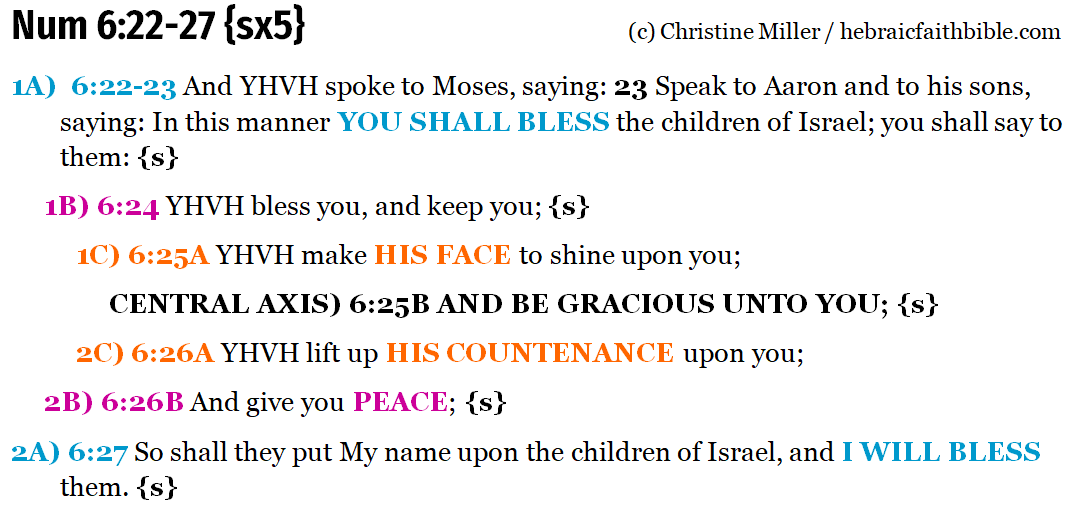Today’s Old Testament chronological reading is in Numbers 5 and 6.
The Psalms/ Proverbs reading is in Psalm 82.
No New Testament reading today.
Hebrew root words.
And YHVH spoke to Moses, saying: Speak to Aaron and to his sons, saying: In this manner you shall bless the children of Israel; you shall say to them: {s}
YHVH bless you, and keep you; {s}
YHVH make His face to shine upon you, and be gracious unto you; {s}
YHVH lift up His countenance upon you, and give you peace. {s}So shall they put My name upon the children of Israel, and I will bless them. {s} Num 6:22-27
Num 6:23, 24, 27 To bless. Strong’s H1288 ברך barak; to fill the upturned palms with good things.
Num 6:24 To keep. Strong’s H8104 שמר shamar; to closely guard for the next generation what is of first importance.
Num 6:25 To shine upon. Strong’s H215 אור owr, “to be or become light.”
aleph א = the ox head, thus strength, power, leader
vav ו = the tent peg, thus add, secure, hook
resh ר = the head of man, thus head, first, top, beginning, man
The story: The cattle (aleph) secured (vav) by the man (resh), thus the cognate words are (cattle) pen, stall, as the place men secure their cattle, and also box, as a livestock stall was in a box shape. Boxes are used to organize and store things, so that there is order instead of chaos, and when God created light, He brought what was chaotic into order.
Num 6:25 To be gracious. Strong’s H2603 חנן chanan, “to be favorably inclined.”
chet ח = the wall, thus outside, divide, half
nun נ, ן = the seed, thus continue, heir, son
nun נ, ן = the seed, thus continue, heir, son
The story: The wall (chet) which continues (nun) to the benefit of the children (nun). In ancient days the family tents of the clan were arranged in a large circle, forming a wall. This circular wall, a wall which continues, enclosed the area of safety for the children of the clan within. This was their home: a place of safety, beauty, favor, and lovingkindness. According to The Ancient Hebrew Lexicon, the English word “home” is from the ch-n root, transposing the m sound for the n over time. Chen, grace, is the same grace that Noah found in the eyes of YHVH (Gen 6:8).
Num 6:26 To lift up upon. Strong’s H5375 נשא nasa, “to take up, to lift up, to pardon.” As per the Ancient Hebrew Lexicon, the shin was transposed from an original sin.
nun נ ן = seed, thus continue, heir, son
sin ס = thorn, thus grab, hate, protect
aleph א = ox head, thus strength, power, leader
The story: Persistently (continually, nun) grabbing hold (sin) with strength (aleph), thus labor, to take up or lift up a burden.
Num 6:26, 27 To give, to put upon. Both Strong’s H7760 שום shuwm, “to appoint, to designate.”
shin ש = two front teeth, thus sharp, press, eat, two, again
vav ו = the tent peg, thus add, secure, hook
mem מ ,ם = the water, thus chaos, mighty, blood
The story: The breath (shin, as that which passes through the teeth) which hooks (vav) water (mem, in the form of vapor) with it and is expelled from the body to the outside. In just this way a man’s character is outwardly expressed from that which is laid up within his heart.
Num 6:25, 26 Face, countenance. Both Strong’s H6440 פנים paniym; from Strong’s H6437 פנה panah, “to turn oneself,” that is, to turn the face toward.
The Hebrew idiom, “make His face shine upon,” merely means, to beam toward. Think of the sun sending its beams toward the earth, which cause pleasant weather and the abundance of the growing season. Think of a parent who sees their child after an absence; their face “beams toward” them in their joyful expression of love.
Think of the Hebrew idiom, “lift up the countenance,” as the opposite of the Hebrew idiom, “fallen countenance:”
And Cain was very angry, and his countenance fell. Gen 4:5
The fallen countenance expresses the negative emotions of disappointment, anger, shame, distress. The uplifted countenance expresses the positive emotions of approval, well-pleased, happiness, confidence. It is this positive attitude and all its nuances with which the Father’s face looks toward His children!
Num 6:26 Peace. Strong’s H7965 שלום shalom; from H7999 שלם shalam, “to be whole.”
Num 6:27 Name. Strong’s H8034 שם shem, “name,” from Strong’s H7760 שום shuwm, “to appoint, to designate,” the same as above.
Num 6:22-27 {sx5} Chiastic structure.
Links to previous studies.
Numbers 5 and 6, In the midst of consecration
Psalm 82, Sons of God
Psalm 82 Reverse parallelism
MARCH 2020 BIBLE READING SCHEDULE | 2020 FULL YEAR READING SCHEDULE


















Leave a Reply